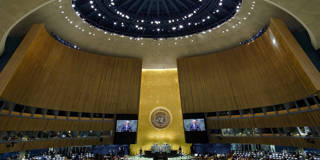The moral universalism enshrined in the Universal Declaration of Human Rights obliges us to recognize the humanity of others and the reality of their suffering. If that doctrine sounds naive in today’s world, it is because we have allowed malignant spoilers to smother this foundational intuition.
VIENNA – Seventy-five years ago this week, United Nations member states meeting in Paris adopted the Universal Declaration of Human Rights. It was not a binding law, only a statement of principle. But it was the first declaration to embed an ancient moral ideal of human equality into the new architecture of international law established in response to the genocidal nationalism that had left so much of the world in ruins after World War II.

VIENNA – Seventy-five years ago this week, United Nations member states meeting in Paris adopted the Universal Declaration of Human Rights. It was not a binding law, only a statement of principle. But it was the first declaration to embed an ancient moral ideal of human equality into the new architecture of international law established in response to the genocidal nationalism that had left so much of the world in ruins after World War II.